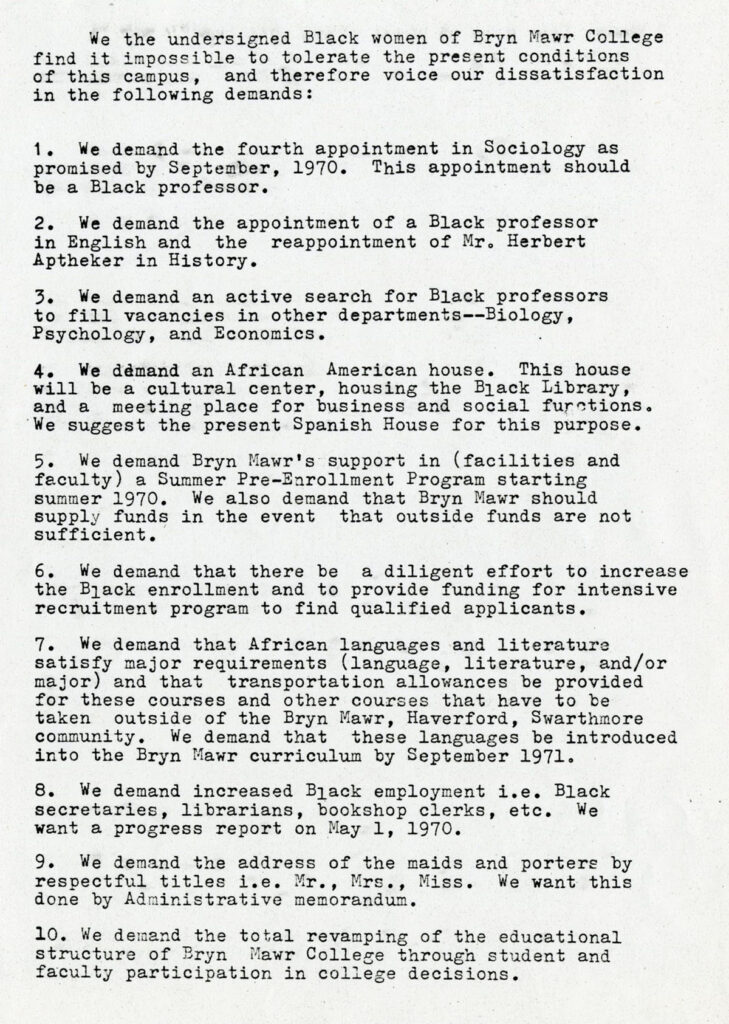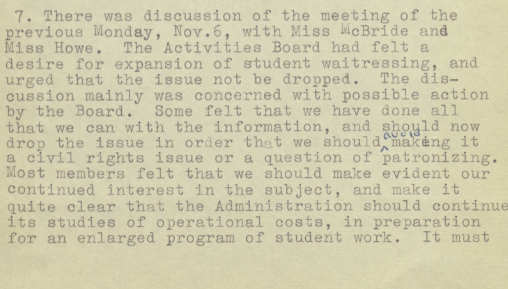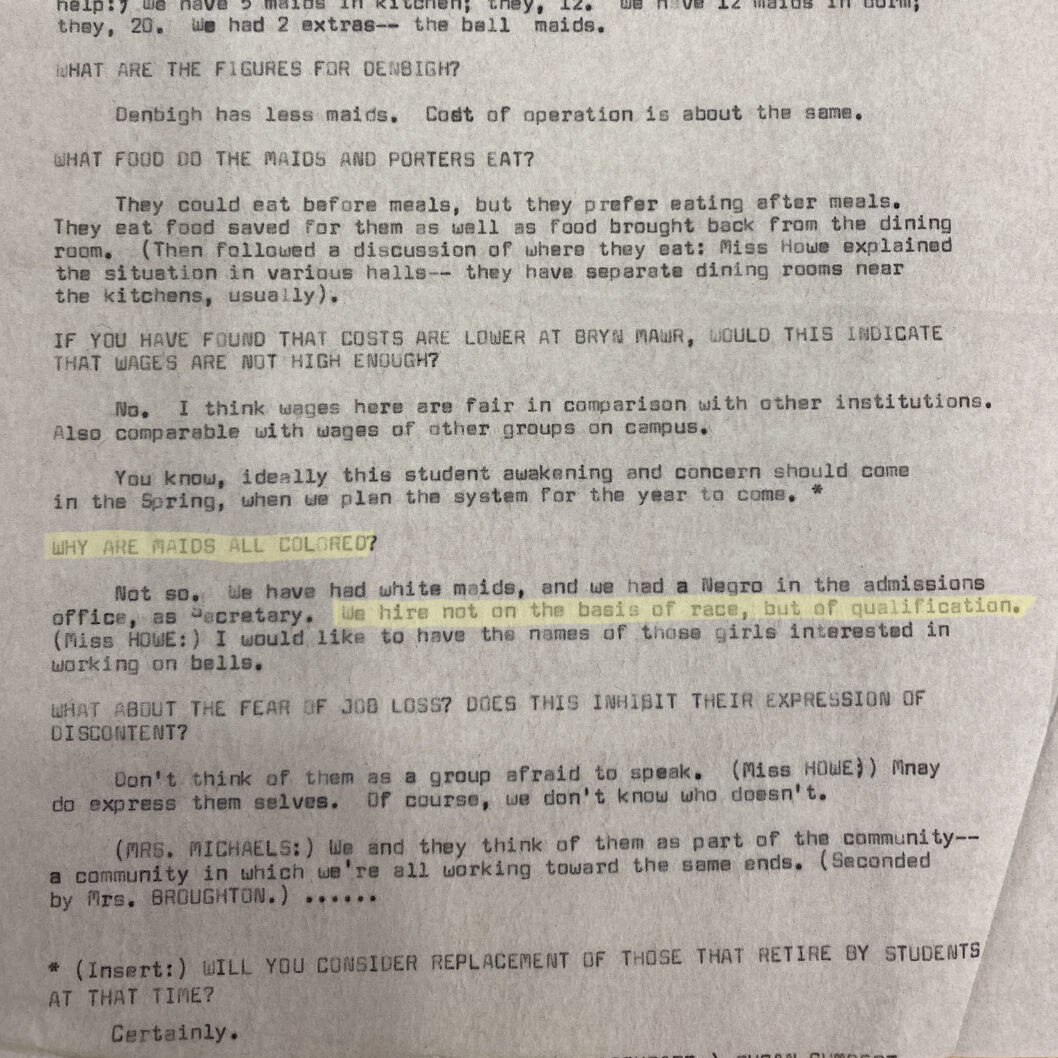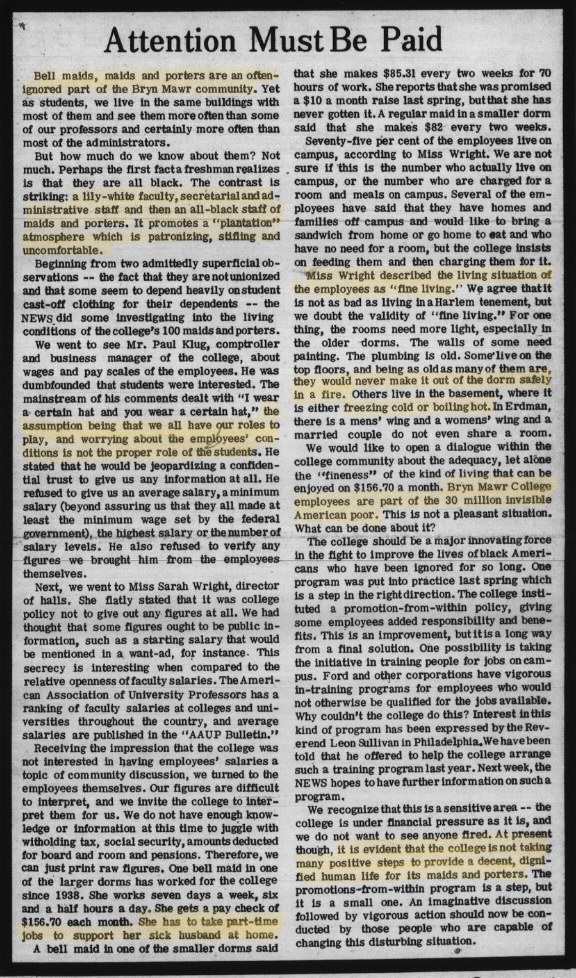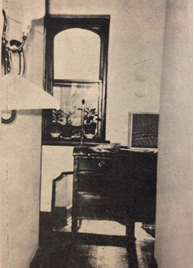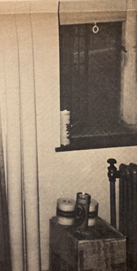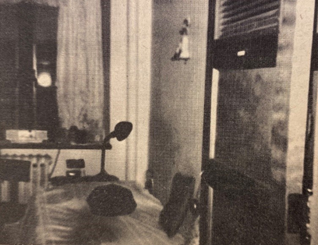Students Speak Out Against the Maids and Porters System
Black employees have been integral to the College since its earliest days but have been overlooked almost always. Black maids and porters provided for students and enabled their academic success by serving and clearing their meals, dusting their rooms, making their beds, and answering their phone calls, among other physical and emotional support. Little attention was paid by the College community to the various other identities these individuals carried beyond their roles on campus. Between 1961 and 1970, undergraduate students enacted a series of petitions and demands aimed at bringing attention to the racist and exploitative system of maids and porters at the College. This decade-long , pursuit was part of the Civil Rights movement’s influence on Bryn Mawr.
“As 1968 approached, things at Bryn Mawr had moved a long way from the gentility of the 1950s. Students now demanded that attention be paid to the all-black staff of maids and porters; there was criticism of the ‘plantation’ qualities of the college, with a focus on how poorly such campus workers were paid.”
Paul Lyons, The People of This Generation: The Rise and Fall of the New Left in Philadelphia (2003)

Learn more about Sally Brown, an early-20th century maid at Bryn Mawr College. Sally’s life is explored as part of the first phase of the Who Built Bryn Mawr project.
A Specific Lens

It takes a great deal of digging through the archives and external resources to piece together who the maids and porters were and what their lives were like at Bryn Mawr. The College archives hold little information about past maids and porters, or current staff, and they tend to be overlooked. This exhibit documents student action towards making the system more just regarding the documentation and archive of staff, and hopes to raise questions of why there is little note of the maids and porters of the past. Who were the maids and porters? Why has Bryn Mawr done a poor job at archiving their lives? Did the maids and porters want to have a bigger presence at the College? These are some of the many questions we are left to ponder over as a result of the inadequate record of the maids and porters.
According to Katherine McBride (President, 1942-70), maids and porters were the backbone of student academic success. They were mostly acknowledged by the College only as maids and porters, and little attention was paid to the various other identities they carried beyond their roles on campus. Before students started to question the practice of having maids and porters at the College, there had been no effort to raise the consciousness of campus to see the full humanity of the people behind the uniforms. Even today, the College archives holds several information about the annual plays maids and porters put on for students, but holds little other information about them.
“…despite the fact that they [maids] were often incredibly close to the students, they rarely feature in the memorializing students did of their lives here.”
Maids, Porters and the Hidden World of Work at Bryn Mawr College: Celebrating Stories for Black History Month

The documents the College has are mostly from student clubs and organizations. What we know about the lives of maids and porters is blanketed by students’ perspectives: what students found interesting, appreciated, or challenged. What can we imagine maids and porters feeling and thinking during the turbulent period of the 1960s? How did the few Black students on campus feel knowing the maids and porters were primarily Black? What else is missing from the College archives?
1961-1970: Mr., Mrs., and Miss
“In the 1960s and 1970s, the Civil Rights movement was in full force in the country, with its impact felt on every college campus.”
In Black and White by Florence Goff
Most of the Bryn Mawr community addressed staff by their first names only, and this made some students uncomfortable. In late October 1961, during a meeting of the Student Government Association’s Executive and Advisory Board, students brought up a desire to change this practice. Students urged the President’s Office to send a memorandum to the whole Bryn Mawr community requiring that maids and porters be addressed in a more respectful manner. Student’s intent to “equalize terms of address” between staff and students was not talked about in the following meetings. Later on in the decade, the initiative would be brought up again to the executive board to no avail. Almost a decade later, the Black Student League of the College resurfaced the issue.
35 Black Bryn Mawr students with the support of 45 white students made up the sit-in of March 13, 1970. The Black Students League organized the sit-in to protest the lack of acknowledgement of the Black community by the College. A list of 10 demands was given to President McBride, who sought to agree to all of them. Demand number 9 called for the use of respectful titles for maids and porters.
1961-62: Not In My House
During a meeting of the Undergraduate Executive Board, a note was taken down depicting resistance of the Board to deem the Maids and Porters System as a civil rights issue. Members of the Board feared getting into a conversation on civil rights and made efforts to avoid it. It is unclear whether most of the pushback against looking at the maids and porters system as a civil rights issue came from students or the administration. That all maids and porters were Black and most of the student body was white was dismissed as simple chance . President McBride shares this sentiment by reporting that maids are hired “not on the basis of race, but of qualification” when students ask “Why are maids all colored?” during the 1961 interview.
“In response to concerning the advancement of a maid to the position of hall manager, Miss McBride said that no maid had ever asked to be promoted.”
The College News
“Miss McBride stated initially that one should not think of the Maids and Porters set-up as a System but as a practice of having a number of jobs done by people so that the students will have more time for their work.”
The College News, November 8, 1961.
1967: “Attention Must Be Paid”
On Friday, November 3rd of 1967, students published an article in The College News describing the striking contrast between the “lily-white faculty, secretarial and administrative staff” and the “all-black staff of maids and porters.” The students questioned the long hours, unclear wages, and living conditions of the employees, and most importantly, the fact that all maids and porters were Black. Student push against the disrespect and callousness from the College to the maids and porters led to a call for action, its goal being to get the Bryn Mawr community thinking about the “fine living” that the College vocalized for its maids.
“At present though, it is evident that the college is not taking many positive steps to provide a decent, dignified, human life for its maids and porters.”
Attention Must Be
“From the beginning, the maids and porters helped make living gracious.”
Bryn Mawr College, 1985
Late 60s-21st century: New Century, Same Struggle
Eventually, the maids and porter system was phased out into the current system the College has today. Student’s involvement in the conversation increased to the point where President McBride gave an formal address to the student body population about the “rumors” being spread on the living and economic conditions of maids sometime in the late 60s. In this address President McBride told the audience “I want to advise you that working conditions of the maids are of no concern to students.” After her address, Kathy Boudin, a student at the College, spoke up during the meeting in an attempt to force President McBride to acknowledge student interest in the maids and posters system. “The maids are grotesquely underpaid and are an extension of the slavery system.”
“They were people too, and I never got used to the underserved cosseting and care they provided us much younger students. Their seven-day-a-week work schedules, cramped attic rooms, and pathetic pay stubs were downright criminal.”
Kit Bakke Offerings To Athena
Explore the Timeline for the Entire Exhibition

About the Curator
Carolina Itzel Molina (Class of 2023)
What drew you to this topic?
As a First Generation, Low Income Latine, my experience at Bryn Mawr College has been shaped by the many identities I carry. I am a person of color working as a supervisor in dinning services, where staff and student workers who identify as Black, Indigenous, and/or People of Color, primarily work in. When I think about Bryn Mawr, I see myself in the people I work alongside with instead of the professors and administration of the College. My connection to this topic has driven me to explore the maids and porter system, primarily student action toward its dismantling.



